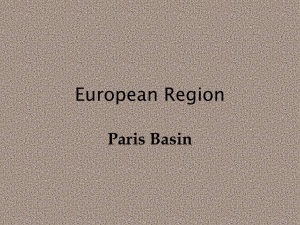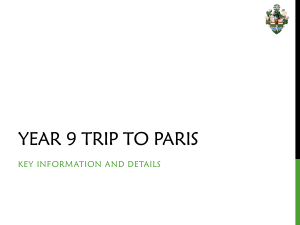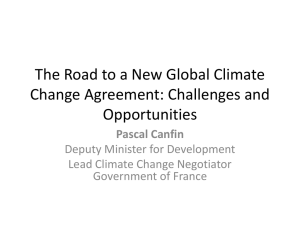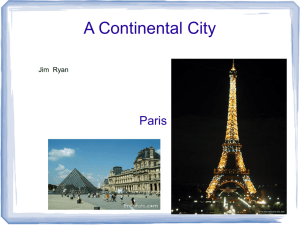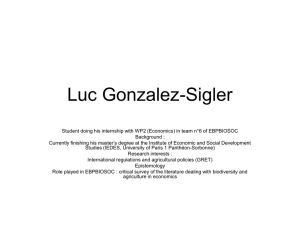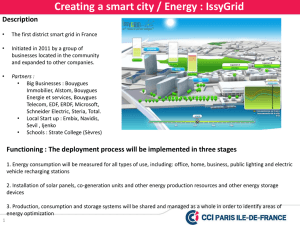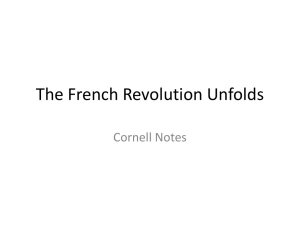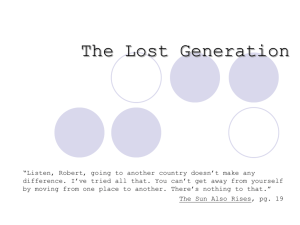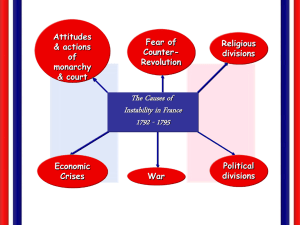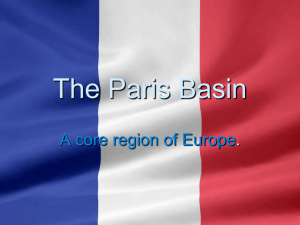Paris Region
advertisement
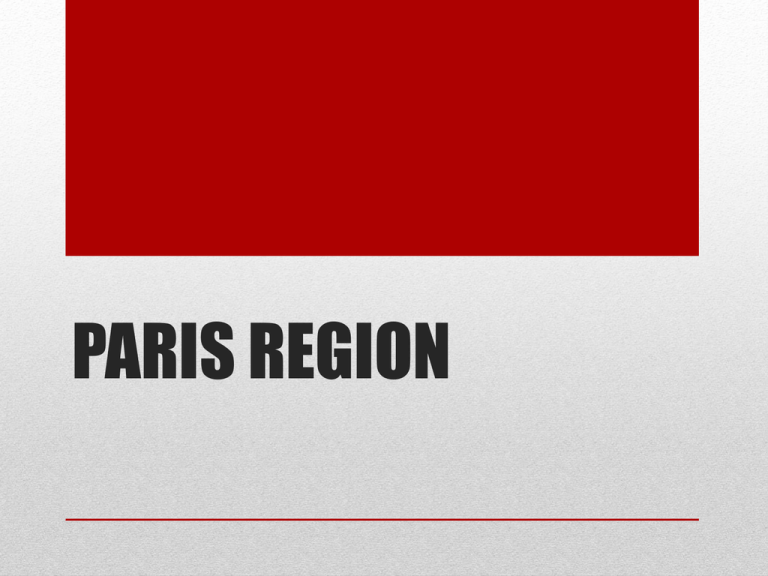
PARIS REGION Paris Basin: Physical Saucer shaped syncline of limestone & chalk. . Centre is called Ile de France. The underlying saucers of rock rise sharply from the centre giving a series of scarps or cotes (lower layers of rock appear-especially in the east) e.g. Cote de Meuse The bedrock is covered by periglacial limon soil (fertile stoneless deposit blown by wind during glaciations) This soil has led to growth of cereals & makes the Paris Basin one of the most agriculturally productive regions in Europe. Climate: West: Maritime… cool temperate oceanic 800mm rainfall pa. 5°C degrees to 16°C degrees East & south of Paris more of a continental climate, mild winters, warm summers… 2°C to 19°C, 700mm rain pa Atlantic depressions lead to 800mm of rainfall per annum equally distributed throughout the year Primary Industry: Farming shows a clear interaction between physical, human & economic processes. Agriculture: One of the most productive agric. regions in EU Due to: *Climate……. Ideal for growth of wheat 58% of all crops, barley & maize. *Soil…. Fertile limon soil *Topography…. Flat landscape, easy to use machinery. …. South more scarp & vale shape so wooded & varied agric. *Large farms….avg 400 hectares, Fully mechanised * Geology…. Saucers of sedimentary rocks allows for local (pays) specialisation of produce. Infrastructure… excellent allowing for ease of export of produce. * Markets…. Nearby (21m people in Paris basin) & European. AGRICULTURE IS VERY SPECIALISED Normandy: ….. North west so has a damper climate, maritime influences, favours grass and dairy production Emphasis on 1. Dairy produce…. milk processed to cheese… Camembert. 2. Apples… Golden delicious…. Cider & apple brandy Calvados. 3. Bloodstock… horses…. soil rich in calcium so good grass & helps bone structure of horses. 4. Wheat along Seine valley. Ile de France: Composed of pays that differ in soil type & agric. production. EU guaranteed prices for produce. Brie: Damp, Intensive & mechanised dairy ind. – modern and intensive, high number of cattle per hectare, produce milk & cheese for Paris Beauce: Large mechanised farms - cereal (wheat) & sugar beet – grown on crop rotation, EU guaranteed prices Champagne: Viticulture Dry… infertile area -- sheep farming Wet… poor soil - cattle grazing Charollais beef Vines producing grapes for Champagne grown on south facing slopes of the scarp – vines struggles on the cooler northern facing scarps.... Vineyards concentrated in Reims which is the marketing centre. Formula for Champagne developed in 18th Century by monks, closely guarded secret Many wine cellars where the wine is matured have been hacked out of the soft chalk soil Energy: Nuclear & fossil fuels. Le Harve… oil port…. Imports, refines & produces petro chemicals. 95% oil imported and no natural gas, 2004 coal production ceased Gas: Piped from south west, Netherlands & Russia. Nuclear energy is the greatest source of power in the Paris Basin (9 nuclear power stations)… produced at Nogent & Penly. After oil crisis in 1973 French reduced their dependence on oil imports – they produce 75% of their energy requirements from 50 nuclear power plants Nuclear power is not affected by oil prices and produces no greenhouse gases but does produce toxic waste i.e. Plutonium so storage is an issue Plutonium requires 24,000yrs to decay by a half Secondary Industry Manufacturing: Centred around Paris - 20% of French National workforce •Accessible for land & sea transport. Seine is navigable for the 160km to Paris, allowing import & export of bulky raw material through Le Harve at its mouth •Nodal point / Focus for road & rail network…. ease of movement of goods. •Agric. raw material close by…. food processing industry thrives. •Major market… greater Paris area has 12m pop. •Large skilled, educated labour force – 17 universities •Tradition of manufacturing … clothing, 70% of electronics and 50% of aircraft. •Near affluent market •Direct Government involvement •Modern infrastructure: TGV, canals, ports, two airports, Channel tunnel Interaction between physical factors….. navigable river economic processes…. large local market human processes …. skilled labour force. Manufacturing sectors: High fashion…. dating back to 17th C fashion houses designing attire for nobles (Haute Couture) Located in city centre, Good for Publicity. Spin off of jewellery & perfume have also developed(Chanel & Cartier) Port Industries: Located on the Seine… engineering -- locomotives & rolling stock + car components. .. (Renault & Citroen) … heavy ind. moving out of Paris due to high cost location Printing & Publishing: Sorbonne university oldest centre of learning… spin off of books, magazines & papers, located in Latin Quarter. Surrounding towns have modern industries like electronics, pharmaceuticals & aircraft components. (Orleans, Rouen, Dijon) Result of de-industrialisation where industry moves outside main city. Cosmetic Valley – Chartres Region, province of Centre, companies like Paco Rabanne, L’Oreal etc. Located there. Examples of companies moving from city centre to suburbs - decentralisation (105 companies employ 7150) Car assembly plant – Renault closed plant in Billancourt Paris and moved to other parts of the Paris Basin – another example of de-industrialisation Ill de France 1994-2004, not immune to job losses, employment declined by 215,000 and it stands at a relatively high 9% Employment per sector: Primary: 4.6% / Secondary: 27.5% / Tertiary: 67.9% Deindustrialisation 1975-2005 employment halved Unemployment rate 9.7% Income disparities: Ile de France….richest area. 2005 173% of EU avg. Normandie…2nd wealthiest… Rouen & Le Harve… port industries Oil refining, engineering, shipbuilding, chemicals & food processing. Picardy & Burgandy…. Poorer regions…. depends on agric. Tertiary Industries 60% of all employment is in tertiary Transport Paris a primate city… its pop is much greater than the next sized city (Lyon). Road & rail focus on Paris. Flat landscape allows ease of access Radial transport system TGV… 350 high speed trains (250kmph)… shortens journey times. Integrated rail system, including channel tunnel, links Paris with Amsterdam, Cologne, Madrid etc Double decker train, environmentally friendly, Paris – Brussles 1hr 20 min Local City Transport Network: SNCF…. National rail network RER…. Regional underground network for Paris suburbs Metro… city underground system. Bus service & city ringed by motorway, inner & outer rings roads River Taxis Tourism: Paris is a tourist centre – main point of entry 30 million visitors Most visited city in the world Culture… art galleries- Louvre. Architecture… Eiffel tower & Arc de triumph & Versailles Major international conference centre. Entertainment… Disneyland & Parc Asterix Castles – Orleans, Reims etc French Presidents: Pompidou centre –1977 - culture and leisure centre – National Museum of Modern Art President Giscard d’Estaing, Les Halles – 1971- previously a fruit and veg market that has been transformed into high end shopping centre, Mitterand – Glass pyramid at entry to Louvre Normandy – beaches – D-Day landing Religious – Notre Dame, Reims Cathedral Human Processes: Population Paris basin pop. = 21million… over one third of Fr. pop. Pop densities vary sharply with Ile de France having 11.3m. Growth Rate is 0.8% Senile Stage, below replacement levels Incentives for larger families • Providing 170wks maternal and paternal leave (40wks Ireland) • Subsidised creche and preschool • Working mother recieve 750 euro per month for one year to have a 3rd child Champagne region.. Rural…low birth rate & out migration. Migration Most popular French Destination 40% of French migrants live here 1/3 of migrants are French from the Empty Diagonal Since World War 2 it has been a melting pot Former French Colonies e.g. Congo Immigrants from China – newest immigrant population Eastern Europeans have expanded since 1989 Ghetto development Integration is a problem Migrants mostly Muslims & France is mainly Catholic.. gave rise to cultural diversity & tension & a ban on religious display in schools, wearing of Hijab Unemployment led to racial tension & since 1981 French citizenship is no longer granted automatically to everyone born there. Racial tensions led to serious riots in 2005 throughout major cities of France Urban Development Paris designed by Haussmann – Regin of Napoleon III Developed along river Seine. Paris located 172km from mouth of the Seine Primate city, Capital city, bridging point etc contributed to development 3 urban regions are inner, suburbs & satellite towns. It was a walled city up to 1850 when Napoleon III laid out the great boulevards. After WWII migrant influx… built large apartment blocks in suburbs... Les Grande Ensembles… 5 storey complexes. Urban Sprawl – city now 100km² 5 new towns or suburbs built to prevent sprawl e.g. Marne-la-Vallee pop 100,000 Schema Directeur 1960’s The Schema Directeur plan to modernise Paris and control its growth •Conserve historic buildings. Plan ‘listed’ historical buildings & the exteriors cannot be changed. Many have become museums. Urban renewal has taken place. •Limit outward growth of city •Urban renewal and regeneration within city •Dev. growth centres in the inner suburbs with shopping centres Seven growth poles have been developed with emphasis on tertiary industry. E.g. Rungis & Poissy. These reduce pressure on CBD for land as well as decrease traffic volumes. La Defense to west of city… large office complex creating jobs & extends CBD. Futuristic style including the Grande Arche. •Improve transport between city & suburbs •Designation of land for recreational land use Converted Les Halles to shopping & culture area and move food market out to Rungis… ease traffic congestion of delivery trucks. Plan limited high rise buildings in city centre to ten stories. Six new towns were built outside Paris as residential & employment centres. Offices, research centres, technology & business parks. e.g. Marne-la-Valee (location of Disneyland) has now a pop of 220,000 with industrial estates & technology parks… employment in telecommunications & information technology. Overall scheme was successful
